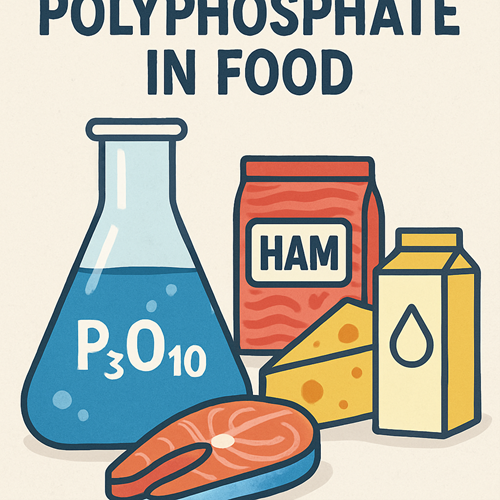

Polyphosphate is a common food additive that you might not even realize you're consuming. It's used in a variety of foods, from processed meats to seafood, dairy products, and even some beverages. In this article, we will explore what polyphosphate is, why it is used in food, and the potential benefits and risks associated with its consumption.
Polyphosphate refers to a group of phosphates linked together. These compounds are utilized in the food industry for various reasons, including their ability to retain moisture, improve texture, and stabilize foods. They are particularly popular in processed foods due to these properties.
Polyphosphates are often used in:
● Processed meats like ham and sausages to retain water and improve texture.
● Seafood to maintain freshness and moisture content.
● Dairy products such as cheese, where they help to emulsify and stabilize the product.
● Beverages, including sodas, where they prevent the formation of crystals.

Polyphosphate additives offer several advantages that make them valuable in food production. Here are some of the key benefits:
One of the primary reasons for using polyphosphate in food is its ability to retain moisture. This is particularly important in processed meats and seafood, where moisture loss can affect texture and quality. By retaining moisture, polyphosphate helps improve the juiciness and mouthfeel of these products.
Polyphosphates help in achieving the desired texture and flavor in foods. For instance, in cheese production, they act as emulsifiers, ensuring a smooth and consistent product. In meats, they help maintain tenderness, which is crucial for consumer satisfaction.
These additives also play a role in stabilizing foods, preventing separation of ingredients, and extending shelf life. This is particularly useful in products like dairy and beverages, where stability is key to maintaining quality over time.
Despite its benefits, there are some concerns about the use of polyphosphate in food. Here's a look at the potential risks:
One of the primary concerns with polyphosphate consumption is its impact on health. While generally recognized as safe by food safety authorities, excessive intake can lead to health issues. High levels of phosphate in the body can affect bone health, particularly in individuals with kidney problems who may have trouble excreting excess phosphate.
Polyphosphates may contribute to an imbalance in the phosphate-to-calcium ratio in the body. This imbalance can impact bone health, as calcium is vital for maintaining strong bones. Consuming foods high in polyphosphates without adequate calcium intake could potentially lead to issues like osteoporosis.
The widespread use of polyphosphates in various foods raises the risk of overconsumption. Since these additives are present in many processed foods, individuals who frequently consume these products may exceed recommended intake levels without realizing it.

The question of whether polyphosphate is bad for you doesn't have a straightforward answer. For most people, consuming polyphosphate in moderation as part of a balanced diet is unlikely to pose significant health risks. However, individuals with specific health conditions, particularly kidney issues, should be cautious and consult with healthcare professionals regarding their phosphate intake.
To minimize potential risks, consumers should be mindful of their overall phosphate intake. This can be achieved by:
● Reading food labels to identify products containing polyphosphates.
● Balancing processed food consumption with fresh, whole foods that are naturally low in phosphates.
● Consulting healthcare professionals if concerned about phosphate intake, especially for those with pre-existing health conditions.
Polyphosphate is a valuable additive in the food industry, offering benefits like moisture retention, texture improvement, and product stabilization. However, as with any additive, moderation is key. Consumers should be aware of their intake levels and make informed choices about the foods they consume.
By understanding both the benefits and risks of polyphosphate, individuals can make healthier dietary decisions that align with their nutritional needs and lifestyle. As with any aspect of nutrition, balance and moderation are crucial to maintaining overall health and well-being.